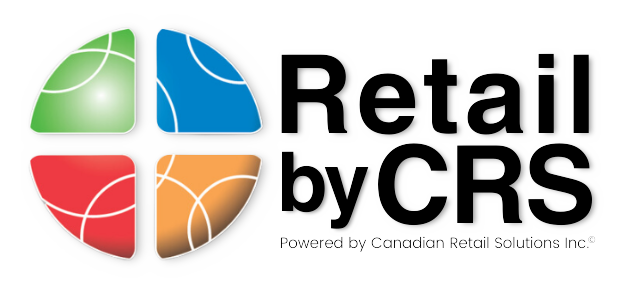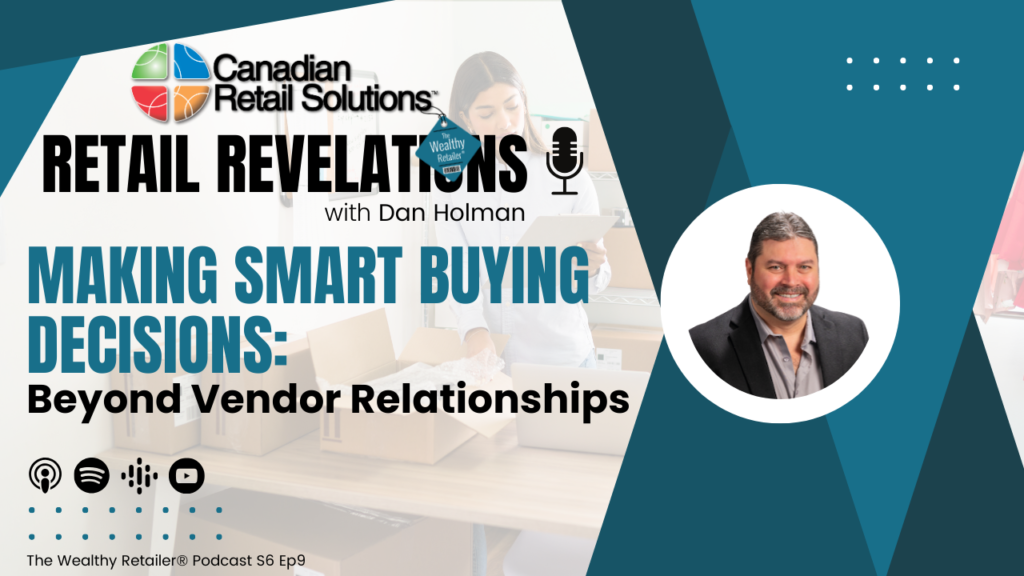Listen to the episode right here OR on your favorite podcast streaming platform! You could also choose to read the episode in the article below if you prefer!
Retail Revelations with Dan Holman
S6 Ep9
In the world of Retail, the importance of relationships cannot be overstated. Building strong connections with vendors, suppliers, and representatives is often considered essential for success. However, too often, businesses make the mistake of basing their buying decisions solely on these relationships, sometimes to their detriment. In this week’s blog, Dan Shares why it’s crucial to stop making bad buying decisions solely based on vendor or representative “relationships” and look at a more rational and strategic approach to procurement.

The Pitfalls of Relying Solely on Vendor Relationships:
Over-Buying
One of the most common pitfalls of leaning heavily on vendor relationships is the potential for over-buying. Businesses may choose to order heavier quantities than they have the ability to sell because they have a close relationship with a particular vendor, believing that the relationship will bring better performance. However, this can lead to overspending and negatively impact sales AND the bottom line.
Missed Opportunities
Relying solely on established relationships can blind businesses to better options in the market. Innovation, cost savings, and improved quality might be available from other vendors, but businesses that are fixated on their current relationships can miss out on these opportunities.
Limited Negotiation Power
A strong vendor relationship can sometimes reduce a business’s negotiation power. When a business is overly loyal to a vendor, it may feel less inclined to seek out competitive alternatives or negotiate for better terms, thinking that the existing relationship will suffice.
Vendor Dependency
Overreliance on a single vendor or a select few can lead to vendor dependency. If something goes wrong with a vendor or they change their terms, or their seasonal presentation, your business may find itself in a vulnerable position, without backup plans or alternatives.

Let’s talk about a more strategic approach to buying;
Objective Evaluation
To avoid the pitfalls of relationship-based buying decisions, retailers should start with an objective evaluation of their needs. This involves defining the specific requirements of each category and what factors are most important, such as quality, price-point, and vendor reliability.
Market Research
After identifying your specific categorial needs, conduct market research to explore the full range of available options. This could involve requesting samples from multiple vendors or suppliers, attending trade shows, and consulting online and community reviews, and expert opinions.
Competitive Bidding
Consider implementing competitive bidding processes for significant purchases. This approach encourages vendors to provide their best offers, ensuring your business gets the most competitive pricing and terms to allow better cash management.
Vendor Performance Metrics
Even after selecting a vendor, it’s essential to continually assess their performance based on agreed-upon metrics. This ensures that the vendor continues to meet your business’s evolving needs and maintains the standards you expect. Look at these 2 key metrics; Cash Margin and Seasonal Sell-Through.
Diversification
To avoid vendor dependency, diversify your vendor base. Having multiple suppliers for critical goods and categories provides a safety net in case one vendor faces difficulties, price increases or poor categorical representation in any given season.

While vendor relationships are extremely valuable and play a crucial role in business, they should not be the sole basis for your buying decisions. By adopting a more strategic and objective approach to buying, you will make well-informed choices that align with your customer’s specific needs and your long-term goals. Remember that the best decisions come from a combination of sound research, competitive analysis, and strong relationships, rather than relying solely on the latter. In doing so, you can steer your business toward more informed, efficient, and cash-profitable buying practices.
Happy Retailing!
Dan
About Dan Holman

Dan has spent 30+ years in the retail and service industries. Specializing in marketing & business development, inventory planning, operations and customer driven sales management, he is an award winning business coach with a proven understanding of what it takes to be successful as an entrepreneur. Dan spent 16 years in senior management and ownership roles with multi-store retailers before joining Canadian Retail Solutions as their CEO, Director of Retail Planning. Dan works directly with clients coast to coast representing hundreds of retail categories. He is the founder of The Wealthy Retailer®, a boutique consulting firm guiding independent retailers to growth, improved profitability and more cash.


